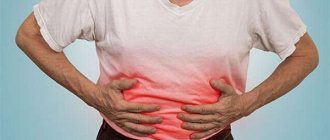Causes of diarrhea
Diarrhea is a natural reaction of the human body, which indicates the presence of pathogenic bacteria and their metabolic products. With the help of frequent urges to defecate, the body tries to cleanse itself of them.
There are several causes of diarrhea with the flu. The most common is considered to be a bacterial infection of the body, the causative agent of which entered the body through the consumption of low-quality products. Infection may also be associated with prolonged or uncontrolled use of medications.
Diarrhea can occur due to disruption of the functioning of the gastrointestinal tract or the occurrence of serious diseases of the internal organs. Rotaviruses, enteroviruses, and adenoviruses can also cause severe diarrhea, which results in symptoms that accompany the development of regular flu.
Rotavirus can enter the intestines not only through contaminated water and insufficiently processed food. Such a pathogen can easily enter the human body through the upper respiratory tract. Having reached the small intestine, the rotavirus infection begins to actively multiply, causing a sudden feeling of nausea, diarrhea, and intense pain in the abdominal cavity.
General recommendations for intestinal viruses
Improper actions during the development of an intestinal virus can cause damage to the body. In order to recover quickly, it is important to respond correctly to the symptoms that appear and take appropriate measures.
Drinking enough water
Every adult should drink 2 liters of drinking water per day. In cases where diarrhea develops, the amount of fluid consumed should be much greater.
When a patient drinks a lot of water, it promotes a speedy recovery. Together with water, toxic compounds that poison are removed from the body.
If diarrhea is accompanied by vomiting, water should be drunk in small sips. Otherwise, vomiting will resume.
As long as the intestinal flu lasts, you should avoid the following drinks:
- coffee;
- alcohol;
- juices;
- nectars.
These drinks speed up intestinal motility and can cause an attack of diarrhea.
Use of antibiotics
If you have intestinal flu, it is better to refrain from using such drugs. In most cases, rejection of such substances occurs. Antibiotics damage the already irritated mucous membrane of the digestive tract.
Instead of using such aggressive drugs, it is better to use drugs containing beneficial bacteria. They restore the mucous membrane and speed up recovery.
We recommend: Causes of burning in the anus after diarrhea
How to eat healthy
When dealing with intestinal flu, in matters of nutrition it is important to focus on your own feelings. If you don't want to eat, you can't force yourself to eat. It is important to beware of foods that aggravate intestinal upset, but you should not give up food completely.
You should not eat cold food. This may cause stomach pain and nausea. Warm rice broth (decoction recipe) has a beneficial effect on the gastrointestinal tract during intestinal flu.
You can drink warm tea by adding a few drops of lemon juice. Natural vitamin C will have a beneficial effect on the immune system, which will contribute to a speedy recovery from the virus.
If diarrhea lasts more than 5 days, you should go to the hospital. In other cases, careful attention to your own body will help you provide competent, timely assistance and will not encounter the negative consequences of intestinal flu.
Symptoms of the disorder
Damage to the gastrointestinal tract occurs suddenly. The patient experiences:
- general weakening of the body;
- headache;
- malaise;
- fatigue;
- deterioration/loss of appetite;
- chills, fever;
- cough, runny nose (rare);
- discomfort/pain in the peritoneal area;
In addition, rumbling, nausea with vomiting, and diarrhea appear. In this case, most often the stool becomes foamy, yellowish or yellowish-green in color. By the number and intensity of bowel movements, you can determine the degree of intoxication of the body and dehydration during diarrhea. Most often, the symptoms in question are accompanied by elevated body temperature (up to 39°).
We recommend reading: The first signs of the flu
How not to confuse it with poisoning
It can be especially difficult to determine why a child has symptoms of a viral infection with diarrhea. It happens that the baby complains of a sore throat, sore throat and weakness. However, after a short period of time, these symptoms disappear, but diarrhea begins.
We recommend: Causes of diarrhea with chickenpox and methods of assistance
In any case, it would be wrong to treat such a condition with drugs that stop diarrhea. By missing the first warning signs of intestinal flu rather than poisoning, parents can treat the symptoms, but leave the virus to infect the child’s body.
If such symptoms develop, it is necessary to consult a doctor in order to begin the correct treatment and not harm the baby.
Often, intestinal flu affects children under one year of age. This disease is characterized by the following symptoms:
- fatigue;
- lethargy;
- temperature up to 39 degrees;
- vomiting up to 5 times a day;
- defecation up to 10 times a day;
- respiratory manifestations.
Treatment of intestinal infection is fundamentally different from therapy for poisoning. You should not decide on your own how to treat this condition. It is better to call a pediatrician at home.
Is diarrhea dangerous with the flu?
Prolonged diarrhea during ARVI is dangerous due to the development of dehydration, which can lead to disastrous consequences if no action is taken to restore the water-salt balance in the body. The greatest danger is diarrhea during ARVI in a child.
In addition, intense watery diarrhea can be fatal (in 3% of cases) if the patient suffers from heart failure. This is due to the formation of excessive stress on the cardiovascular system. Also, prolonged diarrhea negatively affects the functioning of the central nervous system and can cause otitis media, shortness of breath, laryngitis, and impaired blood circulation.
If the patient loses a large amount of fluid, the elasticity and firmness of the skin may decrease, blood pressure will drop to critical levels, as a result of which dizziness, fainting, and coma may develop. Diarrhea removes not only fluid from the body, but also useful compounds necessary for the normal functioning of all systems and organs. Diarrhea that lasts for a long time can lead to exacerbation/formation of hemorrhoids.
Flu danger
The virus spreads quite quickly through particles of saliva and phlegm that are released when talking, sneezing, coughing, and therefore, first of all, it threatens the development of an epidemic. The worst thing that the flu leads to is death, which most often occurs in people with heart disease, the elderly and young children, which is due to weak immunity and delayed treatment. More often, viral infections lead to complications of chronic diseases, the development of respiratory tract diseases, for example, bronchitis, tuberculosis, pneumonia. Influenza viruses affect the nervous system, heart, blood vessels, liver, kidneys and other organs; partial loss of hearing or vision may occur, especially in older people whose body is not able to fight the consequences of the disease. Quite often, with the flu, illnesses suffered in the past, for example, kidney inflammation, wake up. Another danger with ARVI, accompanied by fever, vomiting, and diarrhea, is dehydration, characterized by a lack of fluid. Dehydration in a newborn baby can lead to death in just a few hours. In addition, infectious diseases harm the growing body, causing various pathologies and developmental delays.
Treatment methods
It should be borne in mind that taking medications aimed at eliminating diarrhea can only eliminate unpleasant symptoms. In most cases, therapy aimed at destroying the pathogen is necessary. The following are methods for treating Staphylococcus aureus and restoring intestinal microflora.
Medications
The following are used as drug therapy for ARVI with diarrhea:
- Preparations to restore the water-salt balance in the body, as well as to prevent the loss of electrolytes. This category of medicine includes Regidron, a saline solution intended for internal use. The medicinal contents contained in a special bag must be diluted with cooled boiled water, according to the instructions for use. Consume in small sips. You should also drink plenty of other liquids (fruit drinks, compotes, still mineral water, warm tea).
- Sorbents (Smecta, Activated carbon, Enterosgel). Such medications have an adsorbent effect, due to which they help cleanse the body of harmful elements released by viruses.
- Antibiotic drugs (prescribed in case of bacterial infection). The most common are: Enterosfuril, Furazolidone.
- Medicines containing enzymes (Mezim, Festal, Pancreatin). They help make food easier to digest.
- Probiotic medicines (Linex). Necessary for restoring positive intestinal microflora.
We recommend reading: Conjunctivitis with ARVI
The doctor may also prescribe medications whose action is aimed at relieving accompanying painful symptoms (antipyretics, antivirals, immunomodulators, antiemetics).
Folk remedies
To relieve diarrhea, you can use folk recipes:
- Rice water. This product eliminates signs of intoxication in the body. To make it, you need to cook the washed rice for about 60 minutes. after the liquid boils. As a result, the cereal should be completely boiled. When ready, strain the broth and cool at room temperature. Adults take 0.1 liter three times a day, children – 1 teaspoon 3 times a day.
- Ginger drink. To prepare the healing liquid, you need to pour a piece of ginger root 1 tbsp. boiling water After the mixture has cooled slightly, add a slice of lemon and natural honey (to taste). Infuse for half an hour. When the drink is ready, take 0.1 liter three times a day.
- Raspberry infusion. To prepare the medicine, pour 1 tbsp of washed raspberries. boiling water, leave for a third of an hour to infuse. The prepared healing drink can be drunk to relieve severe diarrhea.
If severe watery diarrhea occurs, it is strongly recommended to seek medical help to avoid dehydration and other unpleasant consequences.
Diet
If the unpleasant phenomenon in question in the form of diarrhea develops, it is necessary to temporarily exclude fermented milk products from the menu, which can worsen the clinical picture. Milk is a suitable medium for the proliferation of pathogenic microorganisms. In addition, rotavirus can provoke secondary lactase deficiency, as a result of which the patient will feel even worse.
Doctors advise eating rice porridge cooked in water. This dish is indicated for patients who do not vomit. To prevent nausea, it is necessary to consume the product in small portions with short breaks between meals.
During diarrhea, foods high in carbohydrates, fruits, natural and packaged juices are contraindicated. Such products contribute to the development of fermentation in the gastrointestinal tract and increased diarrhea.
We recommend reading: Flu symptoms
It is also worth monitoring your drinking regime. It is necessary to drink a large amount of liquid in small sips every day; it is advisable to use saline solutions that maintain the water-salt balance in the human body. This is very important, since diarrhea causes dehydration due to the excretion of fluid along with feces.
Prevention
To reduce the risk of developing unpleasant symptoms, you should adhere to the following preventive measures:
- Wash your hands with soap and water before eating, as well as after visiting the restroom, walking, or being in a public place.
- Drink boiled water, avoid tap water.
- Subject sufficient heat treatment to meat, fish and other products.
- Wash vegetables and fruits thoroughly before consumption.
- If possible, avoid eating at public catering establishments.
In addition, it should be borne in mind that dairy products purchased from an untrusted place can serve as a source of gastrointestinal upset due to the content of a large number of pathogenic bacteria.
Doctors also recommend strengthening your immune system through hardening, regular walks in the fresh air, eating healthy foods, giving up bad habits, and using multivitamin complexes (after consultation with your doctor).
Preventive measures
Intestinal flu is a disease that can be avoided if you take the following precautions:
- wash your hands regularly after going outside, visiting public places, contacting animals, and before each meal;
- consume fresh, high-quality food products, paying attention to the production date and shelf life;
- eat only washed vegetables, fruits, berries, thermally processed foods: meat, fish, eggs;
- drink purified water;
- regularly disinfect children's toys, hygiene items, and household items;
- do not visit crowded places during an epidemic of viral or cold diseases;
- actively engage in sports;
- monitor your diet;
- avoid emotional overstrain.
To avoid infection with infectious diseases, you need to strengthen your immune system through physical exercise, hardening, maintaining a healthy lifestyle, and taking vitamin and mineral complexes.
We recommend: Causes of diarrhea with mucus in an adult and how to treat it correctly?











